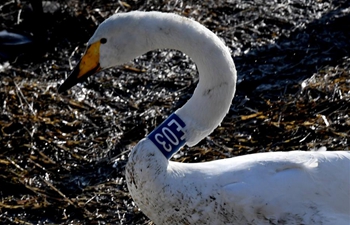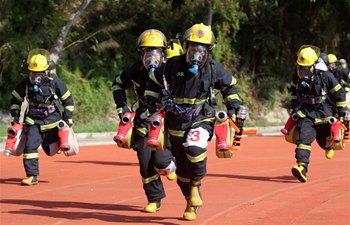GENEVA, Nov. 29 (Xinhua) -- Signals and impacts of the long-term global warming trend have continued in 2018, following the 20 warmest years recorded in the past 22 years, the UN meteorological agency warned on Thursday ahead of UN climate change negotiations slated for next week.
According to the World Meteorological Organization (WMO) Provisional Statement on the State of the Climate in 2018, the climate change momentum still remains undeterred.
Aside from the records of the warmest years for the past 22 years, with the top four in the past four years, other signs of climate change including sea level rise, ocean heat and acidification and sea-ice and glacier melt continue, while extreme weather left a trail of devastation on all continents.
The report shows that the global average temperature for the first ten months of the year was nearly one degrees Celsius above the pre-industrial baseline of 1850 to 1900. Though 2018 started with a weak La Nina event, by October sea-surface temperatures in the eastern Tropical Pacific were showing signs of a return to El Nino conditions, which, if develops, means that 2019 is likely to be warmer than 2018.
Meanwhile, carbon dioxide, methane and nitrous oxide concentrations reached new highs in 2017, according to the latest WMO Greenhouse Gas Bulletin. More than 90 percent of the energy trapped by greenhouse gases and 25 percent of anthropogenic CO2 emissions have been absorbed by oceans that, as a result, have turned warmer and more acidic.
WMO data show that for each three-month period until September 2018, ocean heat content was the highest or second highest on record, and Global Mean Sea Level from January to July 2018 was around two to three millimeters higher than the same period in 2017.
Such an undeterred warming trend has resulted, among many other impacts, in an above-average number of tropical cyclones in all four Northern Hemisphere basins in 2018, with 70 reported by Nov. 20, compared with the long-term average of 53, thus leading to many casualties.
As the southwest India suffered in August the worst flooding since the 1920s, which displaced more than 1.4 million people and affected more than 5.4 million, large parts of Europe experienced exceptional heat and drought through the late spring and summer of 2018, leading to wildfires in Scandinavia.
"We are not on track to meet climate change targets and rein in temperature increases," said WMO Secretary-General Petteri Taalas. "It is worth repeating once again that we are the first generation to fully understand climate change and the last generation to be able to do something about it."
The WMO report was released just ahead of UN climate change negotiations set for Dec. 2 to 14 in Katowice, Poland. The meeting is to adopt the implementation guidelines of the Paris Agreement on Climate Change, which aims to hold the global average temperature increase to as close as possible to 1.5 degrees Celsius.

















